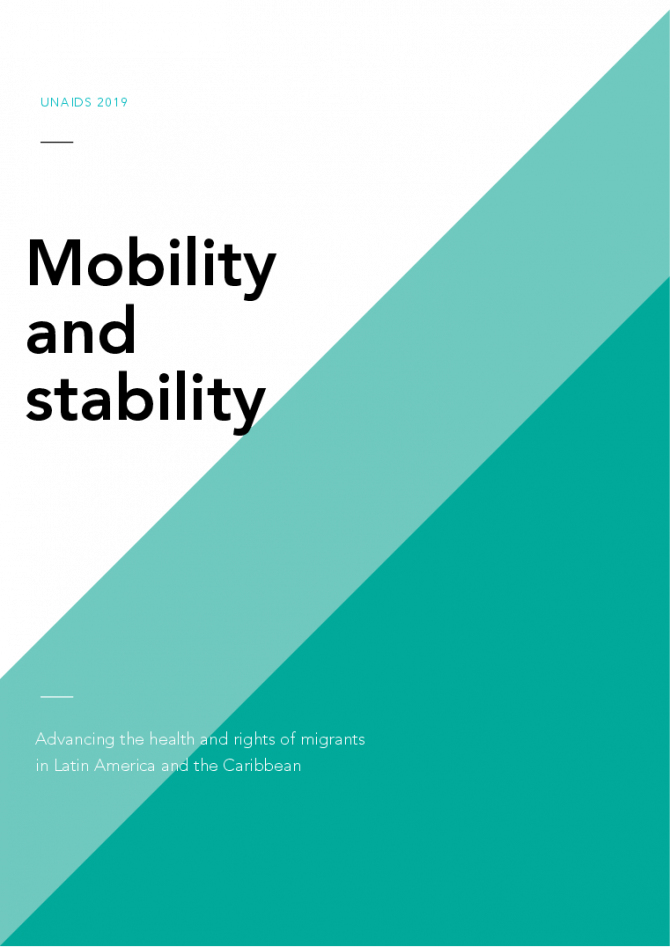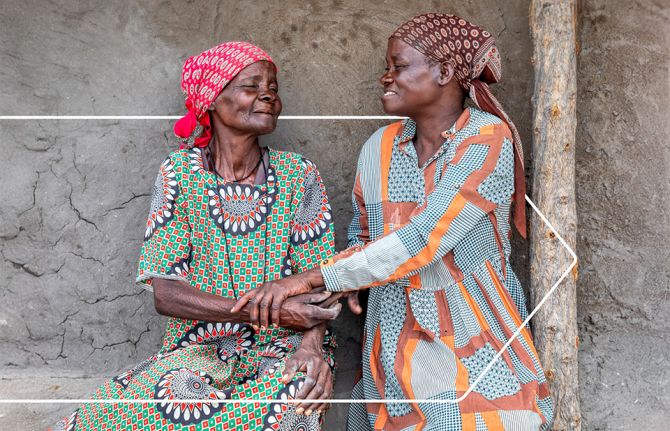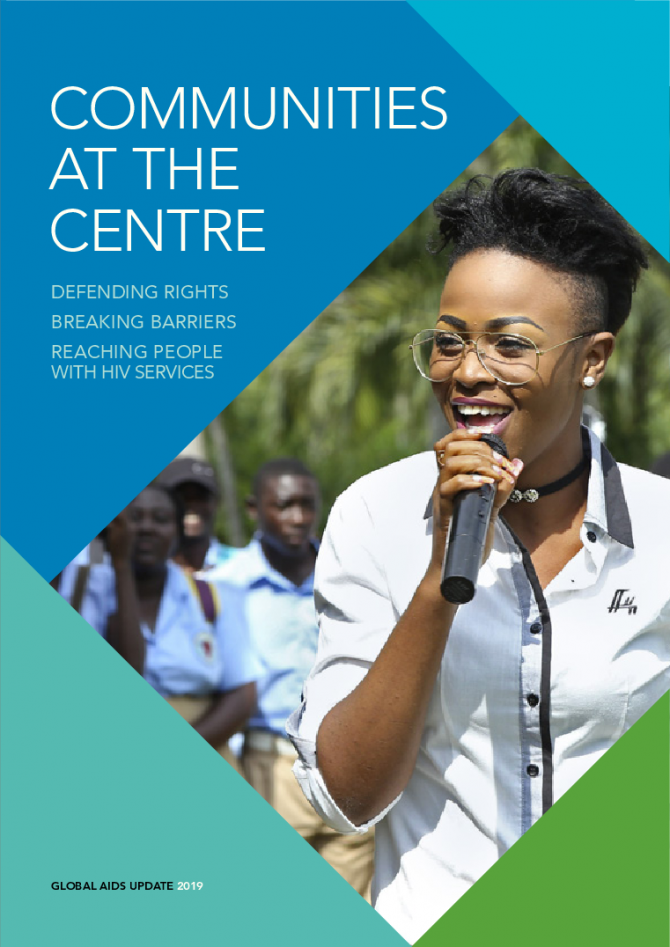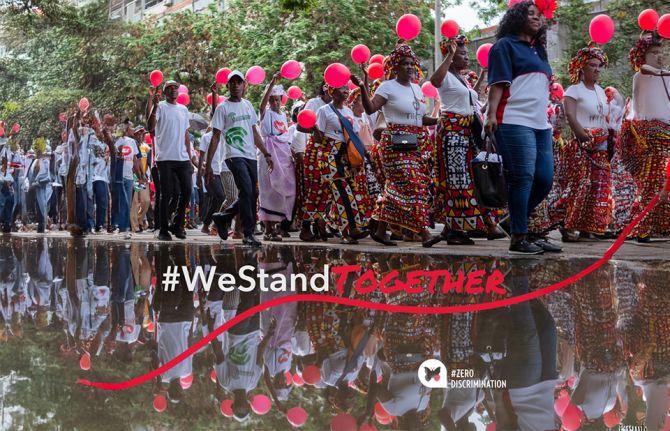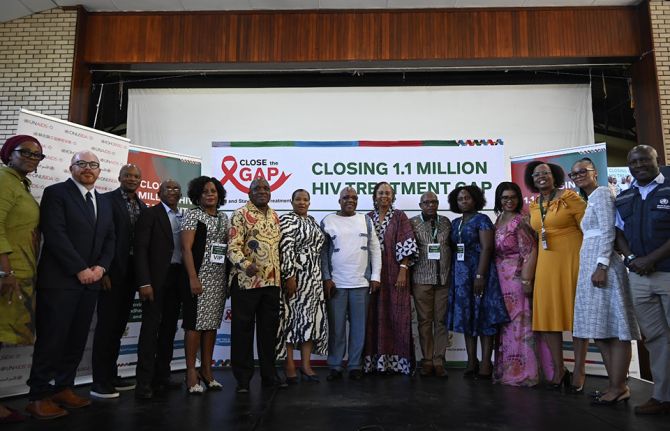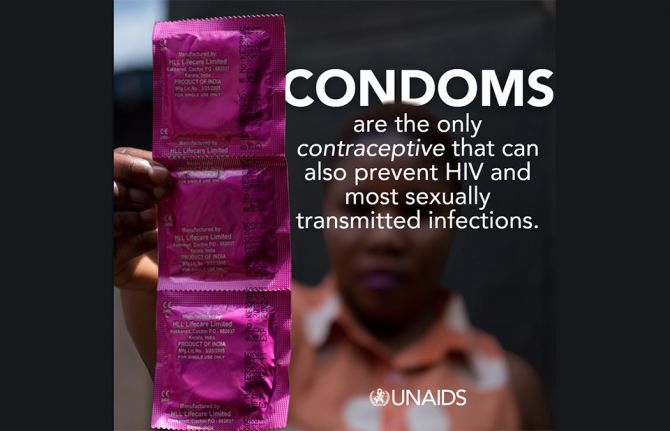Health and development

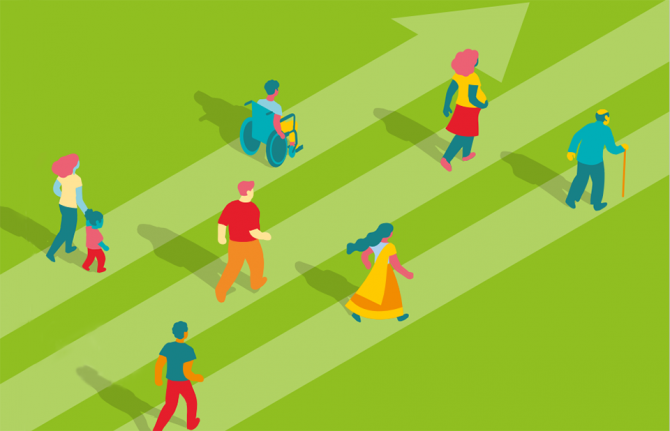
Press Release
Member States negotiating the pandemic instrument have an opportunity to save lives and keep the world safe, says UNAIDS
18 February 2024 18 February 2024As Member States enter the next stage of drafting and negotiating a new Pandemics Prevention, Preparedness and Response Accord, and the targeted revision of the International Health Regulations (IHR), UNAIDS underscores the importance of protecting the gains made in the AIDS response and encourages Member States to use that experience to help prevent and respond to future pandemics and health emergencies.
As part of the Sustainable Development Goals and the 2021 UN Political Declaration on HIV/AIDS, world leaders have committed to ending AIDS as a public health threat by 2030. COVID-19 increased HIV vulnerability and disrupted HIV service access for millions of people around the world. The colliding pandemics of HIV and COVID-19 also led to significant setbacks in the TB response. This experience illustrated powerfully how the impact of other pandemics has the potential to halt and reverse gains achieved in the fight against AIDS.
HIV remains an ongoing pandemic which would be affected by the impact of future pandemics. The actions necessary to make the world safer from future pandemics are vital for ensuring the end of AIDS as a public health threat and for protecting people living with and affected by HIV. Equally, doing what is needed to end AIDS will help keep the world safer from other pandemics.
At UNAIDS, efforts to support Member States in the pandemic treaty negotiations are rooted in evidence. At UNAIDS, we adhere always and only to facts, science, data and the lived experience of the people in the communities and countries where we work to support and guide the HIV response. We resolutely urge that all who are engaging in the negotiations do the same, standing for evidence, and categorically rejecting any misinformation, mischaracterization, or misattribution. The systematic use of facts and data in the HIV response has built public trust, and hugely contributed to advances in HIV prevention, testing, treatment and care.
Important lessons from the HIV response that can strengthen broader pandemic prevention, preparedness and response include:
- The infrastructure built up and strengthened to respond to the HIV pandemic – from lab systems, surveillance and health information systems, procurement and supply chain management through to community infrastructure and governance approaches – is vital for addressing other pandemics. For example, this infrastructure was widely deployed and played an essential role in helping countries to respond to the COVID-19 pandemic.
- Enabling equitable and timely access to scientific solutions, health technologies and medical countermeasures to all those in need is critical for saving lives and ending a pandemic. The role of regulation in ensuring the sharing of technology and know-how for generating local capacities in addressing pandemics is key.
- Tackling the inequalities which drive HIV and other pandemics is key to overcoming them. Closing social and economic gaps within and between countries will help the world to avoid the millions of preventable deaths the AIDS pandemic has seen from being repeated in future pandemics.
- Pandemic prevention, preparedness and response cannot succeed without mobilizing and enabling communities to lead themselves. Investing in community-led mechanisms is critical for successful prevention and response to pandemics.
- Human rights must be at the centre of all actions to prevent and respond to HIV and all other pandemics. The 2021 United Nations Political Declaration on HIV and AIDS, notes the need to “respect, promote, protect, and fulfil all human rights, which are universal, indivisible, interdependent and interrelated.”
- HIV has shown us that beyond being a health issue, a pandemic is a gender, social, economic, security, legal and human rights issue. Whole-of-government, whole-of-society approaches have driven progress in the HIV response. They should be employed at all levels of governance in pandemic preparedness and response.
The gains made and the lesson learnt in the global response to AIDS can help the world to be better prepared for the pandemics to come.
UNAIDS
The Joint United Nations Programme on HIV/AIDS (UNAIDS) leads and inspires the world to achieve its shared vision of zero new HIV infections, zero discrimination and zero AIDS-related deaths. UNAIDS unites the efforts of 11 UN organizations—UNHCR, UNICEF, WFP, UNDP, UNFPA, UNODC, UN Women, ILO, UNESCO, WHO and the World Bank—and works closely with global and national partners towards ending the AIDS epidemic by 2030 as part of the Sustainable Development Goals. Learn more at unaids.org and connect with us on Facebook, Twitter, Instagram and YouTube.

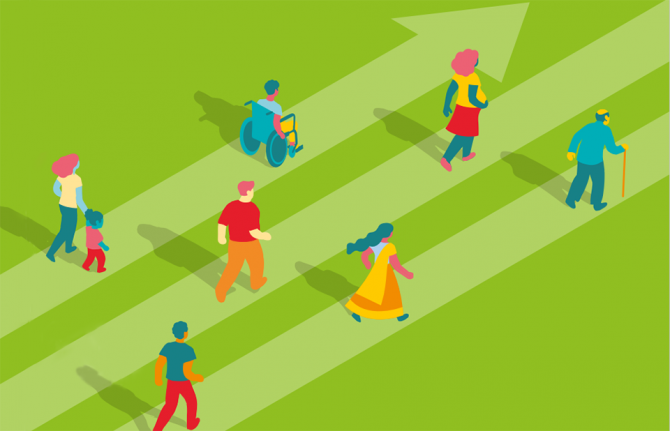
Press Statement
Pandemic Accord: UNAIDS offers lessons from the AIDS pandemic on Bureau’s text
24 July 2023 24 July 2023UNAIDS offers lessons from the AIDS pandemic on the Intergovernmental Negotiating Body Pandemic Accord Bureau text
GENEVA, 24 July 2023—The Joint United Nations Programme on HIV/AIDS (UNAIDS) offers lessons learnt from the HIV/AIDS pandemic to strengthen and sharpen the bureau text of the Pandemic Accord to ensure a truly robust response to current pandemics, and to prevent, prepare for and respond to pandemics of the future.
UNAIDS and the global response to AIDS have unique experience and insight over the past forty years in responding to pandemics. The global AIDS response has shown how effective a pandemic response can be which it outlined recently in its Global AIDS Update 2023 – The Path that Ends AIDS.
While COVID-19 increased HIV vulnerability and disrupted HIV service access for millions of people around the world, the AIDS response, systems, infrastructure and governance model also helped countries respond to both HIV and COVID-19. UNAIDS has a critical interest in protecting the gains in the HIV response, preventing future pandemics and health emergencies which impact people living with and affected by HIV and which could set back efforts to end AIDS by 2030.
Drawing on the more than a quarter-century as a global leader of the fight to end AIDS as a public health threat, UNAIDS offers the following lessons learned for strengthening the current bureau text of the Pandemic Accord:
General language
The current draft could be amended to incorporate much clearer, stronger language on the obligations of high-income countries (HICs) to ensure worldwide access to pandemic products and to proactively provide financial and technical support to enable pandemic responses in low- and middle-income countries (LMICs). The frequent use of “as appropriate” language could be replaced by clear language that conveys the obligation of states to act. In the current draft, much of the burden for prevention and surveillance falls on LMICs, without communicating clear obligations of HICs to assist and support LMICs. It could also have text that commits all countries to prioritise health and medical research.
Human rights and equity
While the draft identifies human rights and equity as core principles of pandemic preparedness, the draft could clarify language regarding the member states’ commitment to protect human rights and ensure equity in all aspects of pandemic prevention, preparedness and response (PPR). The accord could: reconsider the definition of “persons in vulnerable situations” (Art. 1); explicitly reference States obligations to protect and fulfil human rights within its “general principles” (Art. 3.1); mainstream concern for equity throughout provisions of the accord; emphasize formal and substantive equality, alongside non-discrimination, as general principles (Art. 3.1)
Equitable access
With respect to equitable access to pandemic-related products, the bureau draft uses language that suggests that recommended actions are advisory rather than obligatory. UNAIDS recommends that the draft :
- Clearly commit countries that possess pandemic-related medical technologies and knowhow to share it with LMICs in a timely and meaningful manner, including requirements in funding and purchasing agreements for institutions and companies in HICs to share intellectual property rights, technologies and knowhow with researchers and capable manufacturers in LMICs.
- Commit to provide robust financial and technical support for collaborative research between institutions in the North and South to build R&D capacity in LMICs – not only for pandemics and not only for manufacturing, but to enable LMICs to contribute to progress in science and technology for all of humanity.
- Countries to make full use of TRIPS flexibilities to address public health needs during a health emergency.
- Commit all states to waive intellectual property provisions for all pandemic-related products during pandemic and recovery periods.
- Commit Member States to provide political leadership and robust financial and technical support to build strong, flexible medical manufacturing capacity in LMICs before the next pandemic emerges. With future pandemics, surge support will be essential to adapt this capacity in LMICs to manufacture pandemic-relevant products.
- If and when demand for pandemic-relevant products outstrips supply during future pandemics, all Member States must commit to abide by WHO product allocation prioritization recommendations to ensure equitable access, with particular attention to the most vulnerable populations.
Access and benefit sharing
Although the draft specifies obligations among LMICs for actions pertaining to surveillance and the timely sharing of pathogens and data, the draft should be revised to commit Member States to ensure equitable access, including sharing the benefits and profits from the sale of these pathogens. Draw lessons from the Ebola where pathogens from Africa were shared but the medicines were stockpiled in the north leaving people in Africa waiting for charitable donations. The Accord should build on the precedence of the Pandemic Influenza Preparedness agreement (PIP) which facilitates sharing of pathogens and benefits both in terms of vaccines and profit.
Common but differentiated responsibility
While PPR is a shared responsibility of Member States, the draft could make clear that the nature and extent of responsibilities are differentiated based on each country’s financial and technological resources and capacities. As the effects of epidemics are felt most heavily in poor and vulnerable populations, countries that are home to these populations require additional assistance.
Inclusion of community and civil society
Community-led responses play critical roles in reaching marginalized communities with essential health messages and services during a pandemic – as both HIV and COVID-19 have shown – but communities remain under-resourced and inadequately integrated as key partners in national PPR efforts. The Pandemic Accord must acknowledge the central role of community-led responses and commit member states to include communities and civil society in decision-making, planning, preparation, implementation and monitoring.
Sustainable investments in health systems and infrastructure
Sustainable, resilient, well-resourced, equitable, human rights-based and people-centred health systems are essential to PPR and to efforts to achieve Universal Health Coverage. The HIV response has shown clearly how it is possible to leverage HIV investments to build stronger, inclusive, sustainable health and social service systems that respond to both HIV and other health threats. Drawing on previously recommended language on differentiated responsibilities based on national financial and technical capacity, the draft could clearly commit countries to invest major new public financing in health systems – ensuring a well-trained, well-remunerated health workforce (including community health workers); strengthening primary health care; ensuring access to health technologies (including those that are locally produced); and strengthening and effectively using health information systems.
Multisectoral governance
HIV has pioneered inclusive, accountable, participatory health governance across multiple sectors and with community, but there is a risk that PPR governance will be devised as a technocratic, top-down enterprise that does not include the central contributions of communities and civil society. The draft could insist that PPR governance mechanisms be fully inclusive of key stakeholders and integrated at national and regional levels to deal with current pandemics and future health crises. Language on whole-of-government and whole-of-society approaches should be strengthened.
Conclusion
Pandemics continue to exact enormous costs on societies across the world – an estimated 630,000 people died of AIDS-related causes in 2022, and long COVID will has lasting effects on human health and well-being and health infrastructure. In responses to HIV and COVID-19, too many countries and communities have been left to fend for themselves. Responding effectively to current and future pandemics requires the global community to summon the principles of solidarity, equity and people-centred action at the heart of the 2030 Agenda for Sustainable Development. Through learning by doing over decades, the HIV response has shown how it is possible to respond effectively to a pandemic. UNAIDS strongly encourages countries to take on board UNAIDS lessons learned when negotiating revisions to the bureau draft of the Pandemic Accord.
UNAIDS
The Joint United Nations Programme on HIV/AIDS (UNAIDS) leads and inspires the world to achieve its shared vision of zero new HIV infections, zero discrimination and zero AIDS-related deaths. UNAIDS unites the efforts of 11 UN organizations—UNHCR, UNICEF, WFP, UNDP, UNFPA, UNODC, UN Women, ILO, UNESCO, WHO and the World Bank—and works closely with global and national partners towards ending the AIDS epidemic by 2030 as part of the Sustainable Development Goals. Learn more at unaids.org and connect with us on Facebook, Twitter, Instagram and YouTube.

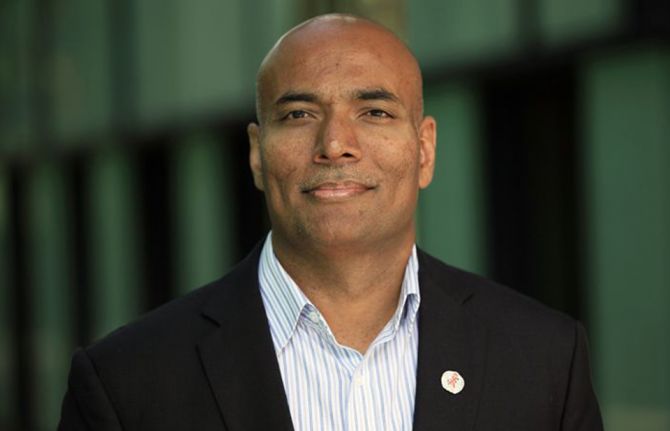
Press Release
UNAIDS Director of Innovation receives prestigious Social Innovators of the Year award
19 January 2022 19 January 2022GENEVA, 19 January 2022—The Schwab Foundation for Social Entrepreneurship has announced that the Director of Innovation at UNAIDS, Pradeep Kakkattil, has been awarded a 2022 Social Innovators of the Year award. Mr Kakkattil received the prestigious award for his work in creating the Health Innovation Exchange (HIEx), a platform that links innovators, governments and investors and finds solutions to global health-care problems, from COVID-19 diagnosis to the cost of medicines.
“Today, one in every two people around the world don’t have access to basic health care, which is why social innovations and technologies are so critical to scale up services and address the ever-widening inequalities in access to health care,” said Mr Kakkattil.
During the COVID-19 pandemic, innovators and communities have demonstrated the potential of human ingenuity in responding to health challenges. By bringing health system actors to work closely with innovators and communities, HIEx has been able to fast-track the adoption of innovations and facilitate investments for scaling up innovations that particularly address the needs of the most vulnerable.
“HIV and COVID-19 have shown the price the world has to pay if we ignore investing in resilient health systems,” added Mr Kakkattil. “HIEx contributes to build trust between the public and private sectors to help identify challenges and rapidly implement proven technologies and innovations to maximize health impact.”
The announcement was made on the second day of the World Economic Forum’s Davos Agenda 2022, a virtual forum bringing global leaders together to focus on shaping solutions to the world’s most pressing challenges. Mr Kakkattil was among 15 Social Innovators of the Year awardees, who included a Brazilian entrepreneur using hip-hop to turn favela youth away from crime, a Dutch nurse revolutionizing home health care and a park ranger turned tech founder using Minecraft to revive Australia’s indigenous culture.
“The Social Innovators of the Year 2022 represent a new ecosystem of leaders who are driving change and shifting organizations and systems towards a more just, inclusive, sustainable future,” said Hilde Schwab, co-founder and Chairperson of the Schwab Foundation for Social Entrepreneurship.
The foundation was created in 1998 by Klaus and Hilde Schwab to support a new model for social change, combining the values of mission, compassion and dedication with the best business principles to serve the most disadvantaged and build a better society. For the past 20 years, the foundation has supported the world’s leading social entrepreneurs in their efforts to create a more just, equitable and sustainable world.
UNAIDS
The Joint United Nations Programme on HIV/AIDS (UNAIDS) leads and inspires the world to achieve its shared vision of zero new HIV infections, zero discrimination and zero AIDS-related deaths. UNAIDS unites the efforts of 11 UN organizations—UNHCR, UNICEF, WFP, UNDP, UNFPA, UNODC, UN Women, ILO, UNESCO, WHO and the World Bank—and works closely with global and national partners towards ending the AIDS epidemic by 2030 as part of the Sustainable Development Goals. Learn more at unaids.org and connect with us on Facebook, Twitter, Instagram and YouTube.

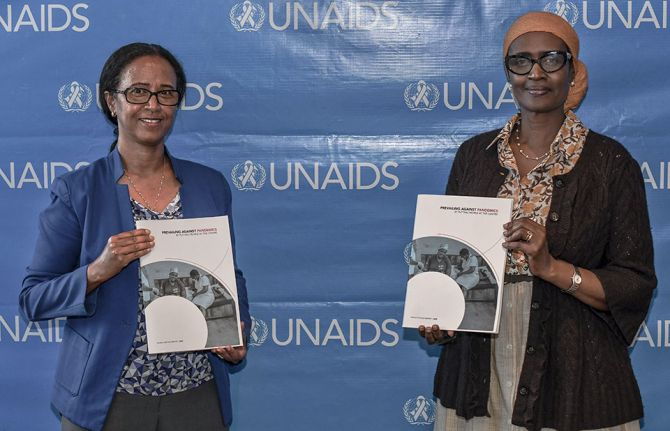
Press Release
UNAIDS calls on countries to step up global action and proposes bold new HIV targets for 2025
26 November 2020 26 November 2020As COVID-19 pushes the AIDS response even further off track and the 2020 targets are missed, UNAIDS is urging countries to learn from the lessons of underinvesting in health and to step up global action to end AIDS and other pandemics
GENEVA, 26 November 2020—In a new report, Prevailing against pandemics by putting people at the centre, UNAIDS is calling on countries to make far greater investments in global pandemic responses and adopt a new set of bold, ambitious but achievable HIV targets. If those targets are met, the world will be back on track to ending AIDS as a public health threat by 2030.
The global AIDS response was off track before the COVID-19 pandemic hit, but the rapid spread of the coronavirus has created additional setbacks. Modelling of the pandemic’s long-term impact on the HIV response shows that there could be an estimated 123 000 to 293 000 additional new HIV infections and 69 000 to 148 000 additional AIDS-related deaths between 2020 and 2022.
“The collective failure to invest sufficiently in comprehensive, rights-based, people-centred HIV responses has come at a terrible price,” said Winnie Byanyima, Executive Director of UNAIDS. “Implementing just the most politically palatable programmes will not turn the tide against COVID-19 or end AIDS. To get the global response back on track will require putting people first and tackling the inequalities on which epidemics thrive.”
New targets for getting back on track
Although some countries in sub-Saharan Africa, such as Botswana and Eswatini, have done remarkably well and have achieved or even exceeded the targets set for 2020, many more countries are falling way behind. The high-performing countries have created a path for others to follow. UNAIDS has worked with its partners to distil those lessons into a set of proposed targets for 2025 that take a people-centred approach.
The targets focus on a high coverage of HIV and reproductive and sexual health services together with the removal of punitive laws and policies and on reducing stigma and discrimination. They put people at the centre, especially the people most at risk and the marginalized—young women and girls, adolescents, sex workers, transgender people, people who inject drugs and gay men and other men who have sex with men.
New HIV service delivery targets aim at achieving a 95% coverage for each sub-population of people living with and at increased risk of HIV. By taking a person-centred approach and focusing on the hotspots, countries will be better placed to control their epidemics.
The 2025 targets also require ensuring a conducive environment for an effective HIV response and include ambitious antidiscrimination targets so that less than 10% of countries have punitive laws and policies, less than 10% of people living with and affected by HIV experience stigma and discrimination and less than 10% experience gender inequality and violence.
Prevailing against pandemics
Insufficient investment and action on HIV and other pandemics left the world exposed to COVID-19. Had health systems and social safety nets been even stronger, the world would have been better positioned to slow the spread of COVID-19 and withstand its impact. COVID-19 has shown that investments in health save lives but also provide a foundation for strong economies. Health and HIV programmes must be fully funded, both in times of plenty and in times of economic crisis.
“No country can defeat these pandemics on its own,” said Ms Byanyima. “A challenge of this magnitude can only be defeated by forging global solidarity, accepting a shared responsibility and mobilizing a response that leaves no one behind. We can do this by sharing the load and working together.”
There are bright spots: the leadership, infrastructure and lessons of the HIV response are being leveraged to fight COVID-19. The HIV response has helped to ensure the continuity of services in the face of extraordinary challenges. The response by communities against COVID-19 has shown what can be achieved by working together.
In addition, the world must learn from the mistakes of the HIV response, when millions in developing countries died waiting for treatment. Even today, more than 12 million people still do not have access to HIV treatment and 1.7 million people became infected with HIV in 2019 because they did not have access to essential HIV services.
Everyone has a right to health, which is why UNAIDS has been a leading advocate for a People’s Vaccine against COVID-19. Promising COVID-19 vaccines are emerging, but we must ensure that they are not the privilege of the rich. Therefore, UNAIDS and partners are calling on pharmaceutical companies to openly share their technology and know-how and to wave their intellectual property rights so that the world can produce successful vaccines at the huge scale and speed required to protect everyone.
UNAIDS
The Joint United Nations Programme on HIV/AIDS (UNAIDS) leads and inspires the world to achieve its shared vision of zero new HIV infections, zero discrimination and zero AIDS-related deaths. UNAIDS unites the efforts of 11 UN organizations—UNHCR, UNICEF, WFP, UNDP, UNFPA, UNODC, UN Women, ILO, UNESCO, WHO and the World Bank—and works closely with global and national partners towards ending the AIDS epidemic by 2030 as part of the Sustainable Development Goals. Learn more at unaids.org and connect with us on Facebook, Twitter, Instagram and YouTube.
Contact
UNAIDS GenevaSophie Barton-Knott
tel. +41 79 514 68 96
bartonknotts@unaids.org
UNAIDS Media
tel. +41 22 791 4237
communications@unaids.org
Press centre
Download the printable version (PDF)


Opinion
Health: providing free health for all, everywhere
20 May 2020
20 May 2020 20 May 2020By Winnie Byanyima, UNAIDS Executive Director — First published in World Economic Forum's Insight Report (May 2020)
Recognizing the public-health catastrophe
As we have seen in wealthier countries, economic and social determinants of ill-health are strong predictors of the likelihood of dying from COVID-19. The greatest risk will be for poor people in poor countries who have a much higher burden of existing illness, and of whom hundreds of millions are malnourished or immunocompromised. For the quarter of the world’s urban population who live in slums, and for many refugees and displaced people, it is not possible to socially distance or to constantly wash hands.
Half the world’s people cannot access essential healthcare even in normal times. While Italy has one doctor for every 243 people, Zambia has one doctor for every 10,000 people. Mali has three ventilators per million people. Average health spending in low-income countries is only $41 per person a year, 70 times less than high-income countries.
The pressure the pandemic will place on health facilities will not only affect people with COVID-19 – anyone needing any care will be impacted. This has previously been the case. During the Ebola epidemic in Sierra Leone there was a 34% increase in maternal mortality and a 24% increase in the stillbirth rate, as fewer women were able to access both pre- and post-natal care.
The International Labour Organization predicts 5 million-25 million jobs will be eradicated, and $860 billion-$3.4 trillion will be lost in labour income. Mass impoverishment will make treatment inaccessible for even more people. Already every year 1 billion people are blocked from healthcare by user fees. This exclusion from vital care won’t only hurt those directly affected – it will put everyone at risk, as a virus can’t be contained if people can’t afford testing or treatment.
Lockdowns without compensation are, at their crudest, forcing millions to choose between danger and hunger. As in many developing country cities, over three quarters of workers are in the informal sector, earning on a daily basis, many who stay in will not have enough to eat and so large numbers will ignore lockdown rules and risk catching the coronavirus.
As we have seen in the AIDS response, governments struggling to contain the crisis may seek scapegoats – migrants, minorities, the socially excluded – making it even harder to reach, test and treat to contain the virus. Donor countries may turn inwards, feeling they can’t afford to help others and, as the presence of COVID-19 anywhere is a threat to people everywhere, this will not only hurt developing countries, it will also exacerbate the challenge in donor countries too.
And yet, amid the pain and fear, the crisis also generates an opportunity for bold, principled, collaborative leadership to change the course of the pandemic and of society.
Seizing the public-health opportunity
Contrary to conventional wisdom that responding to a crisis takes away the capability needed for major health reforms, the biggest steps forward in health have usually happened in response to a major crisis – think of the post-Second World War health systems across Europe and in Japan, or how AIDS and the financial crisis led to universal healthcare in Thailand. Now, in this crisis, leaders across the world have an opportunity to build the health systems that were always needed and which now cannot be delayed any longer.
Universal healthcare
This pandemic has shown that it is in everyone’s interest that people who feel unwell should not check their pocket before they seek help. As the struggle to control an aggressive coronavirus rages on, the case to end user fees in health immediately has become overwhelming.
Free healthcare is not only vital for tackling pandemics: when the Democratic Republic of the Congo instituted free healthcare in 2018 to fight Ebola, healthcare utilization improved across the board with a more than doubling of visits for pneumonia and diarrhoea, and a 20%-50% increase in women giving birth at a clinic – gains that were lost once free healthcare was removed. Free healthcare will also prevent the tragedy of 100 million people driven into extreme poverty by the cost of healthcare every year.
Because COVID-19 has no vaccine yet, all countries will need to be able to limit and hold it. The inevitability of future pandemics makes permanent the need for strong universal health systems in every country in the world.
Publicly funded, cutting-edge medicines and healthcare must be delivered to everyone no matter where they live. To enable universal access, governments must integrate community-led services into public systems. This crisis has also highlighted how our health requires that the health workers who protect and look after us are themselves protected and looked after.
Given the interconnectedness between health and livelihoods, all countries will also need to strengthen social safety nets to enhance resilience. COVID-19 has reminded the world that we need active, accountable, responsible governments to regulate markets, reduce inequality and deliver essential public services. Government is back.
Financing our health
Many developing countries were already facing debt stress leading to cuts in public healthcare. In recognition that worldwide universal healthcare is a global public good, lender governments, international financial institutions and private financial actors need to both extend and go beyond the temporary debt suspensions that have been announced recently. The proposal by the Jubilee Debt Campaign and hundreds of other civil society organizations sets out the kind of ambition required.
Bilateral donors and international financial institutions, including the World Bank, should also offer grants – not loans – to address the social and economic impacts of the pandemic on the poor and most vulnerable groups, including informal sector workers and marginalized populations. Support to developing countries’ ongoing health system costs needs to be stepped up. It would cost approximately $159 billion to double the public health spending of the world’s 85 poorest countries, home to 3.7 billion people. This is less than 8% of the latest US fiscal stimulus alone. It is great to see donor countries using the inspiring and bold language of a new Marshall Plan – but currently pledged contributions are insufficient.
Business leadership
A new kind of leadership is needed from business too; one that recognizes its dependence on healthy societies and on a proper balance between market and state. As President Macron has noted, this pandemic “reveals that some goods and services must be placed outside the rules of the market”. ’The past decade has seen a rapid increase in the commercialization and financialization of healthcare systems across the globe. This must end.
As a group of 175 multimillionaires noted in a public letter released at the World Economic Forum Annual Meeting 2020 in Davos, it is time for “members of the most privileged class of human beings ever to walk the earth” to back “higher and fairer taxes on millionaires and billionaires and prevent individual and corporate tax avoidance and evasion.” Responsible business leaders should support corporate tax reform, nationally and globally, that will necessarily include higher rates, removing exemptions, and closing down tax havens and other tax loopholes.
Despite the lessons from AIDS, monetizing of intellectual property has brought a system of huge private monopolies, insufficient research into key diseases and prices that a majority of the world can’t afford. Countries will need to use all available flexibility to ensure availability of essential health treatments for all their people, and secure new rules that prioritize collective health over private profit. There needs to be prior international agreement that any vaccines and treatments discovered for COVID-19 will be made available to all countries. The proposal by Costa Rica for a “global patent pool” would allow all technologies designed for the detection, prevention, control and treatment of COVID-19 to be openly available, making it impossible for any one company or country to monopolize them. Developing countries must not be priced out or left standing at the back of the pharma queue.
Leadership is needed in reshaping global cooperation: the COVID-19 crisis has exposed our multilateral system as unequal, outdated and unable to respond to today’s challenges. We will face even greater threats than this pandemic, which only an inclusive and just multilateralism will enable us to overcome.
All of us need all of us
The COVID-19 pandemic is simultaneously a crisis worsening existing inequalities and an opportunity that makes those inequalities visible.
The HIV response proves that only a rights-based approach rooted in valuing everybody equally can enable societies to overcome the existential threat of pandemics. Universal healthcare is not a gift from the haves to the have-nots but a right for all and a shared investment in our common safety and wellbeing.
UNAIDS
The Joint United Nations Programme on HIV/AIDS (UNAIDS) leads and inspires the world to achieve its shared vision of zero new HIV infections, zero discrimination and zero AIDS-related deaths. UNAIDS unites the efforts of 11 UN organizations—UNHCR, UNICEF, WFP, UNDP, UNFPA, UNODC, UN Women, ILO, UNESCO, WHO and the World Bank—and works closely with global and national partners towards ending the AIDS epidemic by 2030 as part of the Sustainable Development Goals. Learn more at unaids.org and connect with us on Facebook, Twitter, Instagram and YouTube.
Documents
Mobility and stability — Advancing the health and rights of migrants in Latin America and the Caribbean
03 December 2019
Since 2014, the Bolivarian Republic of Venezuela has been the source of a major migratory movement that has spread across Latin America and the Caribbean. Migrants face intersecting vulnerabilities to HIV and barriers to accessing health care that require interagency, cross-border responses. governments, civil society organizations and communities, supported by the UN Joint Programme on HIV/AIDS (UNAIDS) and other United Nations agencies, are working within the country and across the region to address these vulnerabilities, realize migrants’ right to health and end the AIDS epidemic. Read other documents in the UNAIDS in Focus series
Related
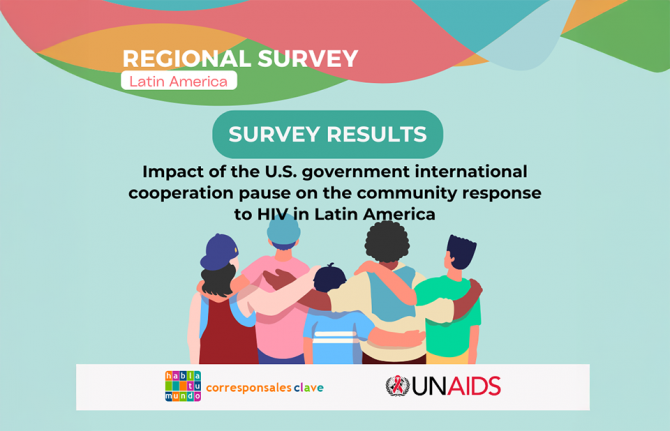 The impact of the United States foreign assistance pause on the community-led HIV response in Latin America
The impact of the United States foreign assistance pause on the community-led HIV response in Latin America

03 March 2025
 Comprehensive Update on HIV Programmes in the Dominican Republic
Comprehensive Update on HIV Programmes in the Dominican Republic

19 February 2025
 The critical impact of the PEPFAR funding freeze for HIV across Latin America and the Caribbean
The critical impact of the PEPFAR funding freeze for HIV across Latin America and the Caribbean
19 February 2025
Impact of community-led and community-based HIV service delivery beyond HIV: case studies from eastern and southern Africa
30 January 2025
A shot at ending AIDS — How new long-acting medicines could revolutionize the HIV response
21 January 2025
Indicators and questions for monitoring progress on the 2021 Political Declaration on HIV and AIDS — Global AIDS Monitoring 2025
17 December 2024
UNAIDS data 2024
02 December 2024


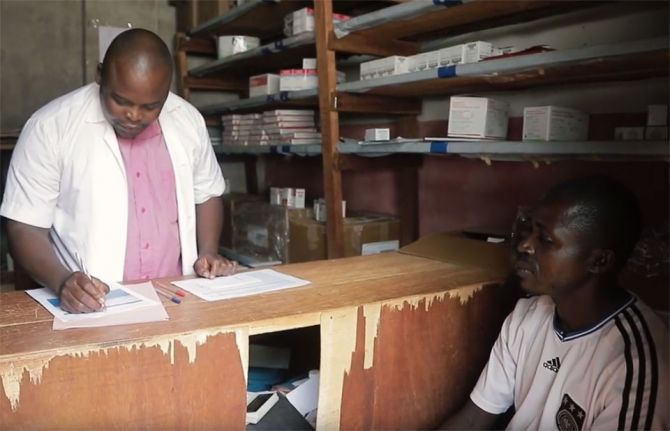
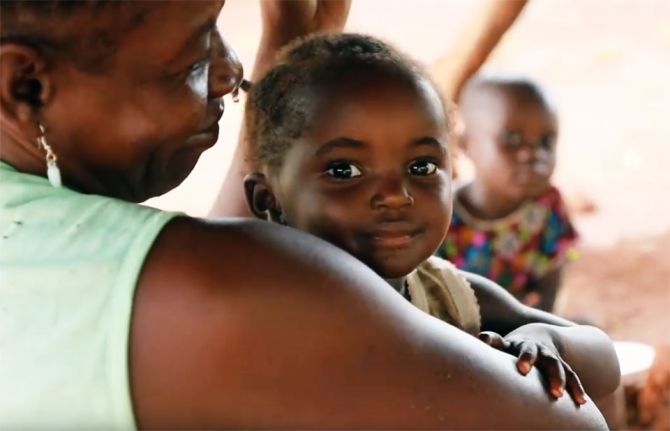
Feature Story
Community groups delivering medicines in remote Central African Republic
21 November 2019
21 November 2019 21 November 2019Zemio is a city cut off from the world. In this remote area of south-eastern Central African Republic, few convoys pass and supplies are difficult to come by. Infrastructure barely exists and illegal checkpoints manned by armed men litter the roads.
Owing to conflict, more than 40 000 people are displaced in the area, and at least 30 000 people have been forced to flee to neighbouring South Sudan and the Democratic Republic of the Congo.
According to the government, the Haut-Mbomou region, where Zemio is located, has the highest HIV prevalence in the Central African Republic: at 12%, more than triple the rest of the country.
But community antiretroviral therapy groups, or CAGs, set up in 2016 by Medecins Sans Frontières, are helping people living with HIV to support and help each other.
In Zemio, the CAGs represent hope in a forgotten conflict.
Region/country
Related
 UNAIDS calls for rights, equality and empowerment for all women and girls on International Women’s Day
UNAIDS calls for rights, equality and empowerment for all women and girls on International Women’s Day

06 March 2025
 U=U can help end HIV stigma and discrimination. Here’s how
U=U can help end HIV stigma and discrimination. Here’s how

27 February 2025

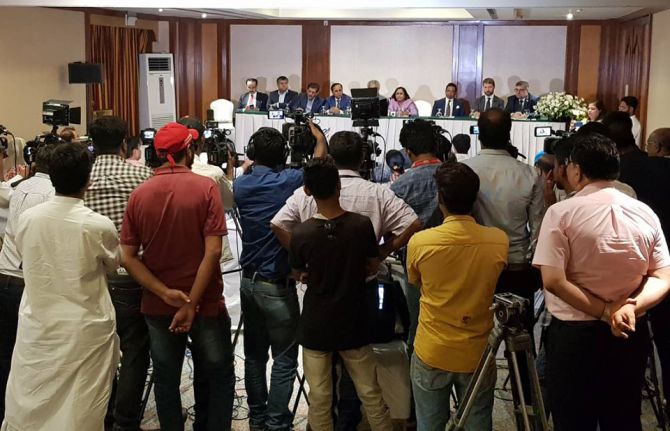
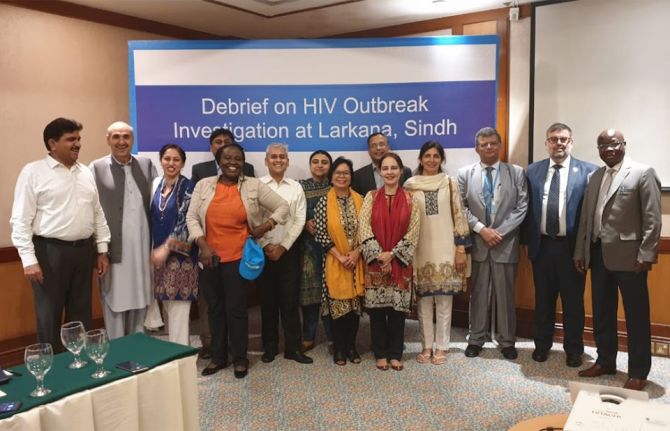
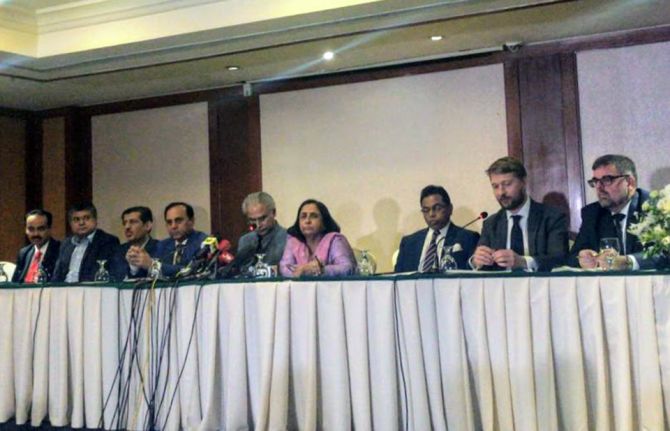
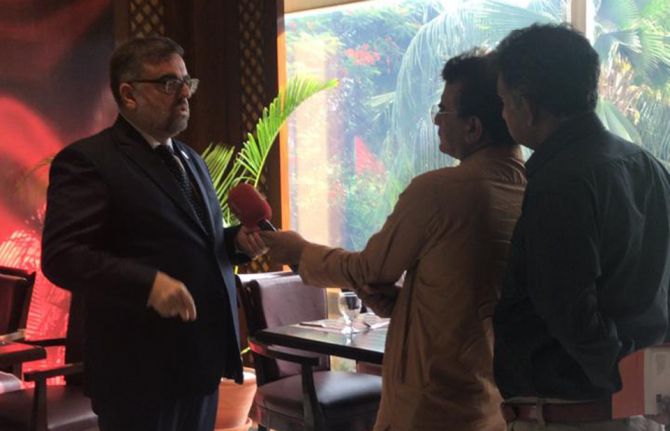
Feature Story
UNAIDS continues to support the response to the HIV outbreak in Pakistan
18 June 2019
18 June 2019 18 June 2019UNAIDS is continuing its support to Pakistan in responding to the outbreak of HIV in Larkana, during which more than 800 people have been newly diagnosed with the virus. More than 80% of the new cases are among children aged under 15, with most among children aged under 5. By 17 June, 396 people had been referred to treatment.
At a press conference on June 14 the authorities presented the findings of a preliminary investigation into the outbreak. It concluded that poor infection control practices, including a lack of sterilization and the re-use of syringes and intravenous drips, are the most significant factors behind the rise in new infections.
“There is a huge amount of work that needs to be done to improve infection control and support the affected children and their families,” said UNAIDS regional director, Eamonn Murphy, during the press conference held in Karachi, Pakistan. “UNAIDS will continue to facilitate and coordinate within the United Nations system and with other partners to ensure that the required support is provided effectively and efficiently,” added Mr Murphy.
As well as improving infection control procedures, the preliminary investigation found that strengthening community education is critical to raise awareness about HIV prevention and to tackle stigma and discrimination. The conclusions of a rapid assessment on HIV-related knowledge presented at the press conference found that information about HIV is very limited among the affected communities. Many parents and caregivers learnt about HIV only on the day their children were diagnosed or because of media reports about the increase in cases. A lack of accurate information created panic and some families with children diagnosed with HIV have been shunned and isolated.
In response, UNAIDS in partnership with UNICEF, UNFPA, the World Health Organization and the JSI Research and Training Institute have been supporting national partners to develop a community response plan to promote health education and reduce stigma and discrimination. The Sindh AIDS Control Programme, together with UNAIDS and UNICEF, has started to train health workers on paediatric case management and health education sessions are being organized with the involvement of community led organizations and religious leaders. Training sessions for local media on responsible HIV reporting are also being carried out.
UNAIDS has been working closely with the federal and provincial governments to provide on-site technical support to help respond to the crisis and mitigate its impact. Sindh’s Ministry of Health has increased its efforts to prevent unlicensed and informal medical practices from operating and, as a result, 900 health clinics and unlicensed blood banks have been closed.
The preliminary investigation was led by the World Health Organization, in partnership with organizations including the Sindh AIDS Control Programme, Aga Khan University, the Field Epidemiology and Laboratory Training Programme, the Dow Medical University in Karachi, the Microbiology Society of Infectious Disease and UN agencies, including UNAIDS, UNICEF and UNFPA.
With 20 000 new HIV infections in 2017, Pakistan has the second fastest growing AIDS epidemic in the Asia Pacific region, with the virus disproportionately affecting the most vulnerable and marginalized, especially key populations. UNAIDS continues to work with the government and partners in Pakistan to strengthen the response in the country.
Region/country
Related
 Status of HIV Programmes in Indonesia
Status of HIV Programmes in Indonesia

24 February 2025

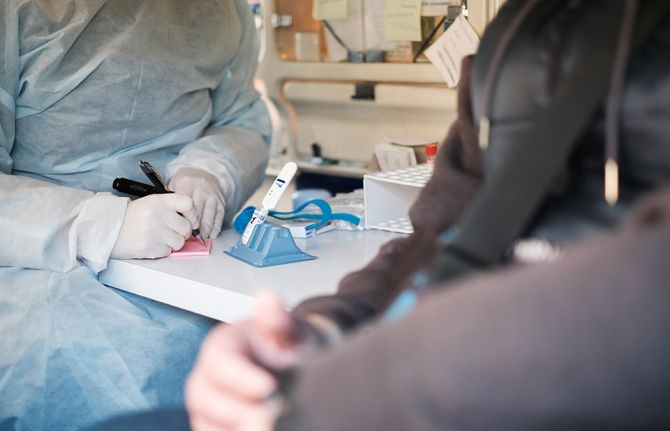
Update
Out-of-pocket expenses hamper access to HIV services
06 May 2019
06 May 2019 06 May 2019User fees and other out-of-pocket expenses―defined as direct payments made by people to health-care providers at the time of service use―are a major barrier to people getting tested for HIV, to people living with HIV being treated and to people living with HIV being retained in treatment and care.
Even if antiretroviral medicines are available free of charge, fees for diagnostic tests, consultations and medicines for opportunistic infections have a huge impact on people living on a lower income. User fees have also been shown to reduce access to health services more broadly among the more vulnerable within society. Out-of-pocket payments make up substantial proportions of total health expenditure in all regions, and in some low- and middle-income countries private out-of-pocket spending is estimated to account for more than 60% of total health expenditure.
According to the World Bank, around 3.4 billion people globally who earn US$ 5.50 a day or less are just one medical bill away from sinking into poverty.




